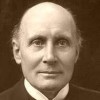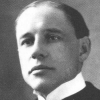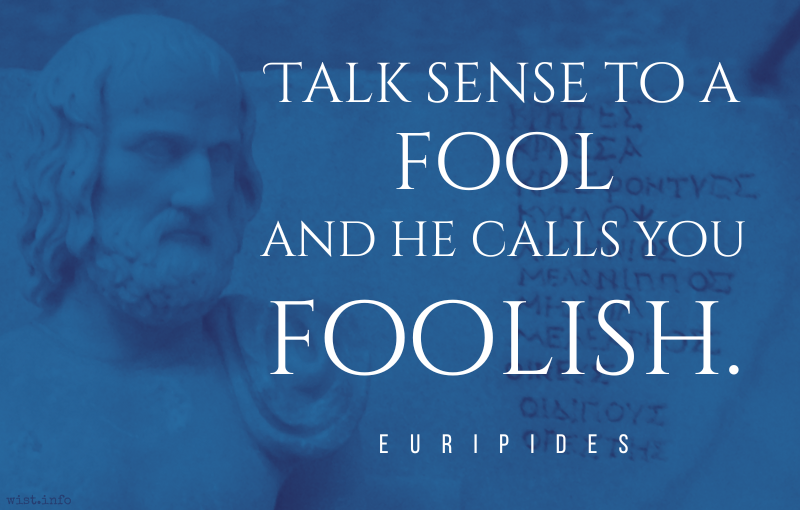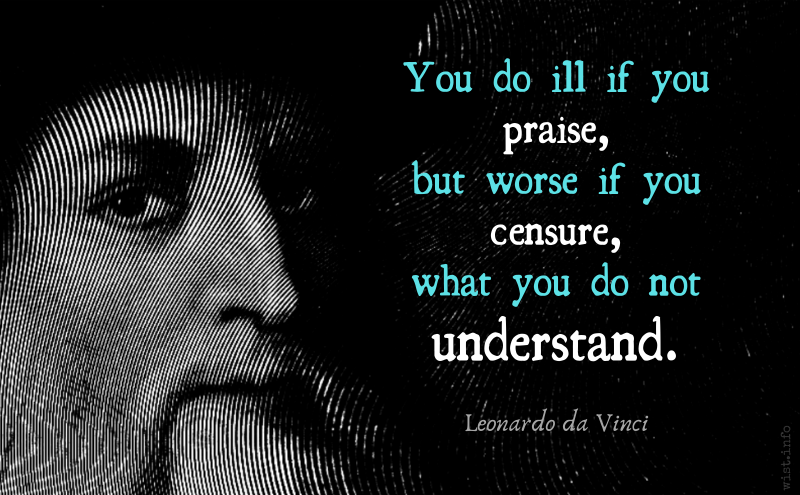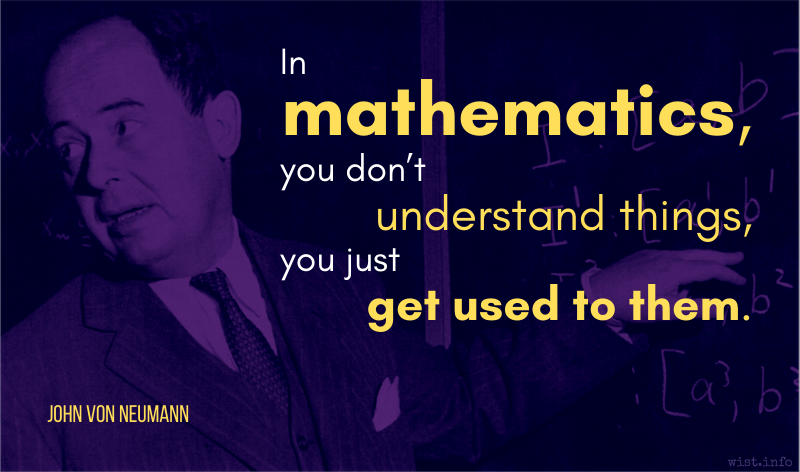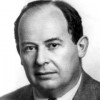Many shall run to and fro, and knowledge shall be increased.
The Bible (The Old Testament) (14th - 2nd C BC) Judeo-Christian sacred scripture [Tanakh, Hebrew Bible], incl. the Apocrypha (Deuterocanonicals)
Daniel 12:4 [KJV (1611)]
(Source)
The Old Greek version of the Septuagint uses a word that translated out to "evil" or "wickedness" or "injustice". Later versions, particularly Theodotian's favored translation, used "knowledge" (Hebrew הַדָּֽעַת or Greek γνῶσις) [notes 1, 2, 3, 4].
Quoted by Francis Bacon as an epigraph on the frontispiece of his Instauratio Magna [The Great Instauration] (1620), in both English (as the King James Version) and Latin: "Multi pertransibunt & augebitur scientia."
Alternate translations:
Many will wander this way and that, and wickedness will go on increasing.
[JB (1966)]
Meanwhile, many people will waste their efforts trying to understand what is happening.
[GNT (1976)]
Many will roam about, this way and that, and wickedness will continue to increase.
[NJB (1985)]
Many will stray far, but knowledge will increase.
[CEB (2011)]
Many shall be running back and forth, and evil shall increase.
[NRSV (2021 ed.)]
Many will range far and wide and knowledge will increase.
[RJPS (2023 ed.)]
Quotations about:
understanding
Note not all quotations have been tagged, so Search may find additional quotes on this topic.
How shallow, puny, and imperfect are efforts to sound the depths in the nature of things. In philosophical discussion, the merest hint of dogmatic certainty as to finality of statement is an exhibition of folly.
Alfred North Whitehead (1861-1947) English mathematician and philosopher
Process and Reality: An Essay in Cosmology, Preface (1929)
(Source)
The book is a collection of his Gifford Lectures, University of Edinburgh (1927-1928).
That is not good language which all understand not.
George Herbert (1593-1633) Welsh priest, orator, poet.
Jacula Prudentum, or Outlandish Proverbs, Sentences, &c. (compiler), # 302 (1640 ed.)
(Source)
When two people decide to get a divorce, it isn’t a sign that they “don’t understand” one another, but a sign that they have, at last, begun to.
Helen Rowland (1875-1950) American journalist and humorist
A Guide to Men, “Divorces” (1922)
(Source)
Within that heav’n which most receives His light
Was I, and saw such things as man nor knows
Nor skills to tell, returning from that height;
For when our intellect is drawing close
To its desire, its paths are so profound
That memory cannot follow where it goes.
Yet now, of that blest realm, whate’er is found
Here in my mind still treasured and possessed
Must set the strain for all my song to sound.
[Nel ciel che più de la sua luce prende
fu’ io, e vidi cose che ridire
né sa né può chi di là sù discende;
perché appressando sé al suo disire,
nostro intelletto si profonda tanto,
che dietro la memoria non può ire.
Veramente quant’io del regno santo
ne la mia mente potei far tesoro,
sarà ora materia del mio canto.]Dante Alighieri (1265-1321) Italian poet
The Divine Comedy [Divina Commedia], Book 3 “Paradiso,” Canto 1, l. 4ff (1.4-12) (1320) [tr. Sayers/Reynolds (1962)]
(Source)
Dante breaks the fourth wall again, to apologize for how little he can remember of the ineffable glories of Heaven (which works out to an entire book's worth).
(Source (Italian)). Alternate translations:
In daring drains
I sing, admitted to the lofty fanes,
Fill'd with the Glory of th' Eternal One.
There saw I things beyond Creation's bourne.
Which none who from her flaming bounds return
Can tell, when soaring Thought is launch'd so far
In Being's vast Abyss, that Mem'ry fails.
Nor dares pursue, altho' with crowded sails
She tries the Voyage o'er th' eternal Bar.
But some small remnant of that heav'nly Spoil,
From that strange Voyage won with arduous toil,
To her dear native soil, the Muse shall bear.
[tr. Boyd (1802), st. 1-3]
In heav’n,
That largeliest of his light partakes, was I,
Witness of things, which to relate again
Surpasseth power of him who comes from thence;
For that, so near approaching its desire
Our intellect is to such depth absorb’d,
That memory cannot follow. Nathless all,
That in my thoughts I of that sacred realm
Could store, shall now be matter of my song.
[tr. Cary (1814)]
In heaven, that drinks the deepest of the light,
Was I, and saw what to recount to sense
He knows not how, nor can, who comes from thence;
Because, approaching nearer its desire,
Dives intellect to such a depth profound
That memory fails, and cannot go beyond
In truth of that dominion's power, whate'er
I can find room to treasure in my mind,
Be now the subject in my song enshrined.
[tr. Bannerman (1850)]
Within that heaven which most his light receives
Was I, and things beheld which to repeat
Nor knows, nor can, who from above descends;
Because in drawing near to its desire
Our intellect ingulphs itself so far,
That after it the memory cannot go.
Truly whatever of the holy realm
I had the power to treasure in my mind
Shall now become the subject of my song.
[tr. Longfellow (1867)]
In the heaven which receives most of His light was I, and I beheld things which whoso descends thence has neither knowledge nor power to tell again, seeing that as it draws near to its desire our understanding plunges so deep, that the memory cannot go after it. Howbeit, so much of the holy realm as I could treasure up within my mind shall now be matter for my lay.
[tr. Butler (1885)]
In the sky which most partaketh of his light
Was I, and things I saw, which to repeat
Knows not, and cannot whoe'er leaves that height.
Because approaching to its yearned-for seat
The intellect deep diveth there so long
That memory behind it cannot fleet.
Of what to the holy kingdom doth belong
Which I had power to treasure in my mind,
Truly shall now be subject of my song.
[tr. Minchin (1885)]
In the heaven that receives most of its light I have been, and have seen things which he who descends from thereabove neither knows how nor is able to recount; because, drawing near to its own desire, our understanding enters so deep, that the memory cannot follow. Truly whatever of the Holy Realm I could treasure up in my mind shall now be the theme of my song.
[tr. Norton (1892)]
In that heaven which most receiveth of his light, have I been ; and have seen things which whoso descendeth from up there hath nor knowledge nor power to re-tell;
because, as it draweth nigh to its desire, our intellect sinketh so deep, that memory cannot go back upon the track.
Nathless, whatever of the holy realm I had the power to treasure in my memory, shall now be matter of my song.
[tr. Wicksteed (1899)]
I was in the heaven that most receives His light and I saw things which he that descends from it has not the knowledge or the power to tell again; for our intellect, drawing near to its desire, sinks so deep that memory cannot follow it. Nevertheless, so much of the holy kingdom as I was able to treasure in my mind shall now be matter of my song.
[tr. Sinclair (1939)]
In that heaven which partakes most of His light
I have been, and have beheld such things as who
Comes down thence has no wit nor power to write;
Such depth our understanding deepens to
When it draws near unto its longing's home
That memory cannot backward with it go.
Nevertheless what of the blest kingdom
Could in my memory, for its treasure, stray
Shall now the matter of my song become.
[tr. Binyon (1943)]
I have been in that Heaven of His most light,
and what I saw, those who descend from there
lack both the knowledge and the power to write.
For as our intellect draws near its goal
it opens to such depths of understanding
as memory cannot plumb within the soul.
Nevertheless, whatever portion time
still leaves me of the treasure of that kingdom
shall now become the subject of my rhyme.
[tr. Ciardi (1970)]
I have been in the heaven that most receives of his light, and have seen things which whoso descends from up there has niehter the knowledge nor the power to relate, because, as draws near to its desire, our intellect enters so deep that memory cannot go back upon the track. Nevertheless, so much of the holy kingdom as I could treasure up in my mind shall now be the matter of my song.
[tr. Singleton (1975)]
I have been in the heaven which takes most of his light,
And I have seen things which cannot be told,
Possibly, by anyone who comes down from up there;
Because, approaching the object of its desires,
Our intellect is so deeply absorbed
That memory cannot follow it all the way.
Nevertheless, what I was able to store up
Of that holy kingdom, in my mind,
Will now be the matter of my poem.
[tr. Sisson (1981)]
I was within the heaven that receives more
of His light; and I saw things that he
who from that height descends, forgets or can
not speak; for nearing its desired end,
our intellect sinks into an abyss
so deep that memory fails to follow it.
Nevertheless, as much as I, within
my mind, could treasure of the holy kingdom
shall now become the matter of my song.
[tr. Mandelbaum (1984)]
I have been in His brightest shining heaven
and seen such things that no man, once returned
from there, has wit or skill to tell about;
for when our intellect draws near its goal
and fathoms to the depths of its desire,
the memory is powerless to follow;
but still, as much of Heaven’s holy realm
as I could store and treasure in my mind
shall now become the subject of my song.
[tr. Musa (1984)]
In the heaven that receives most of his light have I been, and I have seen things that one who comes down from there cannot remember and cannot utter,
for as it draws near to its desire, our intellect goes so deep that the memory cannot follow it.
Nevertheless, as much of the holy kingdom as I was able to treasure up in my mind will now become the matter of my song.
[tr. Durling (2011)]
I have been in that Heaven that knows his light most, and have seen things, which whoever descends from there has neither power, nor knowledge, to relate: because as our intellect draws near to its desire, it reaches such depths that memory cannot go back along the track.
Nevertheless, whatever, of the sacred regions, I had power to treasure in my mind, will now be the subject of my labour.
[tr. Kline (2002)]
High in that sphere which takes from Him most light
I was -- I was! -- and saw things there that no one
who descends knows how or ever can repeat.
For, drawing near to what it most desires,
our intellect so sinks into the deep
no memory can follow it that far.
As much, though, truly of that holy realm
as I could keep as treasure in my mind
will now become the substance of my song.
[tr. Kirkpatrick (2007)]
I was in that heaven which receives
more of His light. He who comes down from there
can neither know nor tell what he has seen,
for, drawing near to its desire,
so deeply is our intellect immersed
that memory cannot follow after it.
Nevertheless, as much of the holy kingdom
as I could store as treasure in my mind
shall now become the subject of my song.
[tr. Hollander/Hollander (2007)]
And though I saw where most of His brightness falls,
What I have seen cannot be represented
Here, for those who have entered Heaven, and descended,
Have come so close to what our minds desire
They sink far in, and bury their knowledge, their power,
So deep that memory cannot recover
A thing. But I will try, truly, to present
Whatever remains in my mind of that holy kingdom
And make it the substance of this song I will sing.
[tr. Raffel (2010)]
I was in the heaven that gets more of its rays
And saw things that those who come down
From on high can’t grasp or else can’t say,
Because nearing what one wants,
Our intellect is so overcome
That our memory is left behind.
Even so, as much of the Holy Kingdom
As my mind could hold on to
Will now be the subject of my song.
[tr. Bang (2021)]
What we do is never understood but always only praised or censured.
[Was wir thun, wird nie verstanden, sondern immer nur gelobt und getadelt.]
Friedrich Nietzsche (1844-1900) German philosopher and poet
The Gay Science [Die fröhliche Wissenschaft], Book 3, § 264 (1882) [tr. Kaufmann (1974)]
(Source)
Also known as La Gaya Scienza, The Joyful Wisdom, or The Joyous Science.
(Source (German)). Alternate translations:
What we do is never understood, but only praised and blamed.
[tr. Common (1911)]
What we do is never understood but always merely praised and reproached.
[tr. Nauckhoff (2001)]
But the ambiguities of metaphorical words, about which I am next to speak, demand no ordinary care and diligence. In the first place, we must beware of taking a figurative expression literally. For the saying of the apostle applies in this case too: “The letter killeth, but the spirit giveth life.”
[Sed verborum translatorum ambiguitates, de quibus deinceps loquendum est, non mediocrem curam industriamque desiderant. Nam in principio cavendum est ne figuratam locutionem ad litteram accipias. Et ad hoc enim pertinet quod ait Apostolus: Littera occidit, spiritus autem vivificat.]Augustine of Hippo (354-430) Christian church father, philosopher, saint [b. Aurelius Augustinus]
On Christian Doctrine [De Doctrina Christiana], Book 3, ch. 5 / § 9 (3.5.9) (AD 397) [tr. Shaw (1858)]
(Source)
Quoting 2 Cor. 3:6.
(Source (Latin)). Alternate translations:
But the ambiguities of figurative words, which are now to be treated, require no little care and industry. For at the outset you must be very careful lest you take figurative expressions literally. What the apostle says pertains to this problem: "For the letter killeth, but the spirit quickeneht."
[tr. Robertson (1958)]
But the ambiguities of metaphorical words, about which I must now speak, require no ordinary care and attention. To begin with, one must take care not to interpret a figurative expression literally. What the apostle says is relevant here: "the letter kills but the spirit gives life."
[tr. Green (1995)]
All ways of expressing ourselves are good if they make us understood. Thus, if the clarity of our thoughts comes through better in a play of words, then the wordplay is good.
Joseph Joubert (1754-1824) French moralist, philosopher, essayist, poet
Pensées [Thoughts], 1805 (1850 ed.) [tr. Auster (1983)]
(Source)
Analog not found in standard translations of the Pensees.
Sorrow is knowledge: they who know the most
Must mourn the deepest o’er the fatal truth,
The Tree of Knowledge is not that of Life.George Gordon, Lord Byron (1788-1824) English poet
“Manfred,” Act 1, sc. 1 [Manfred] (1817)
(Source)
Nothing in education is so astonishing as the amount of ignorance it accumulates in the form of inert facts.
Henry Adams (1838-1918) American journalist, historian, academic, novelist
The Education of Henry Adams, ch. 25 (1907)
(Source)
We hear only half of what is said to us, understand only half of that, believe only half of that, and remember only half of that.
Mignon McLaughlin (1913-1983) American journalist and author
The Neurotic’s Notebook, ch. 5 (1963)
(Source)
It’s through universal Misunderstanding that everybody comes to agreement.
If, by some misfortune, everybody understood each other, one could never come to agree.
[C’est par le malentendu universel que tout le monde s’accorde.
Car si, par malheur, on se comprenait, on ne pourrait jamais s’accorder.]Charles Baudelaire (1821-1867) French poet, essayist, art critic
Journaux Intimes [Intimate Journals], “Mon cœur mis à nu [My Heart Laid Bare],” § 99 (1864–1867; pub. 1887) [tr. Sieburth (2022)]
(Source)
(Source (French)). Alternate translations:
It is by universal misunderstanding that all agree.
For if, by ill luck, people understood each other, they would never agree.
[tr. Isherwood (1930)]
It is by universal misunderstanding that we agree with each other.
If, by some misfortune, we understood each other, we would never agree.
[Source]
It is well to give when asked, but it is better to give unasked, through understanding.
Kahlil Gibran (1883-1931) Lebanese-American poet, writer, painter [Gibran Khalil Gibran]
The Prophet, “Giving” (1923)
(Source)
To suffer torments both of heat and chill,
the Utmost Power gives bodies, fit for that,
not wishing how it does to be revealed.
It’s madness if we hope that rational minds
should ever follow to its end the road
that one true being in three persons takes.
Content yourselves with quia, human kind.
Had you been able to see everything,
Mary need not have laboured to give birth.[A sofferir tormenti, caldi e geli
simili corpi la Virtù dispone
che, come fa, non vuol ch’a noi si sveli.
Matto è chi spera che nostra ragione
possa trascorrer la infinita via
che tiene una sustanza in tre persone.
State contenti, umana gente, al quia;
ché, se potuto aveste veder tutto,
mestier non era parturir Maria.]Dante Alighieri (1265-1321) Italian poet
The Divine Comedy [Divina Commedia], Book 2 “Purgatorio,” Canto 3, l. 31ff (3.31-39) (1314) [tr. Kirkpatrick (2007)]
(Source)
Virgil chides Dante to stop trying to figure out the biology, let alone divine purpose, of the Afterlife, and just accept the what (quia), the existence of it, rather than the how or why, which are as incomprehensible as the Trinity; if human reason could suffice to understand God, there would have been no reason for Jesus to have been born to save humanity.
(Source (Italian)). Alternate translations:
Why these sky-woven forms, that seem to fly
All mortal sense, can suffer and enjoy
Heav'n's bliss, and all th' extremes of fire and frost,
That Power that so decrees, can best explain:
Created plummet sounds that depth in vain.
In that, as in the Trinal Union, lost.
Too anxious mortals! learn to be resign'd;
Could the deep secrets of th' Almighty Mind
Be seen, nor Sin nor Savior had been known.
[tr. Boyd (1802), st. 7-8]
To endure
Torments of heat and cold extreme, like frames
That virtue hath dispos’d, which how it works
Wills not to us should be reveal’d. Insane
Who hopes, our reason may that space explore,
Which holds three persons in one substance knit.
Seek not the wherefore, race of human kind;
Could ye have seen the whole, no need had been
For Mary to bring forth.
[tr. Cary (1814)]
To suffer torments, both the cold and hot,
Bodies alike in form has he annealed --
The how he wishes not to use revealed.
Foolish! who think our reason can unveil,
Or hope to pass the infinital way
To find three persons one Substantiality:
Remain content without the manner how.
Could you have seen at once the whole of worth,
Why was it meet Maria should bring forth?
[tr. Bannerman (1850)]
To suffer torments, both of cold and heat,
Bodies like this that Power provides, which wills
That how it works be not unveiled to us.
Insane is he who hopeth that our reason
Can traverse the illimitable way,
Which the one Substance in three Persons follows!
Mortals, remain contented at the Quia;
For if ye had been able to see all,
No need there were for Mary to give birth.
[tr. Longfellow (1867)]
To suffer torments both of heat and cold that Power ordains such bodies, which will not that the manner of its working be revealed to us. Mad is he who hopes that our reason can travel over the boundless way, which one Substance in three Persons holds. Remain content, race of mankind, at the quia, for if you could have seen all no need was there that Mary should bring forth.
[tr. Butler (1885)]
To suffer torments, heat, and cold, is given
To bodies like to this, by high decree,
The how 'tis done by man cannot be riven.
He's mad who thinks our human reason free
Along the infinite career to run,
Of God, the substance one in Persons three.
Be ye content, O man, the Why unknown:
Had ye been able to behold the whole,
No need had Mary to bring forth her son.
[tr. Minchin (1885)]
To suffer torments, both hot and cold, bodies like this the Power ordains, which wills not that how it acts be revealed to us. Mad is he who hopes that our reason can traverse the infinite way which One Substance in Three Persons holds. Be content, human race, with the quia; for if ye had been able to see everything, need had not been for Mary to bear child.
[tr. Norton (1892)]
To suffer torments, heat and frost, bodies such as these that power disposes, which will not that its workings be revealed to us.
Mad is he who hopes that our reason may compass that infinitude which one substance in three persons fills.
Be ye content, O human race, with the quia! For if ye had been able to see the whole, no need was there for Mary to give birth.
[tr. Okey (1901)]
The Power fits such bodies as these to suffer torments of heat and frost which wills not that the way of its working should be revealed to us. Foolish is he who hopes that our reason can trace the infinite ways taken by one Substance in three Persons. Rest content, race of men, with the quia; for if you had been able to see all there was no need for Mary to give birth.
[tr. Sinclair (1939)]
That power disposes bodies like to mine
In torments both of heat and frost to weep
Which wills not that its working we divine.
He is mad who hopes that reason in its sweep
The infinite way can traverse back and forth
Which the Three Persons in one substance keep.
With the quia stay content, children of earth!
For if the whole before your eyes had lain,
No need was there for Mary to give birth.
[tr. Binyon (1943)]
Bodies like mine, to bear pain, cold and heat,
That power ordains, whose will forever spreads
A veil between its working and our wit.
Madness! that reason lodged in human heads
should hope to traverse backward and unweave
The infinite path Three-personed Substance treads.
Content you with the quia, sons of Eve,
For had you power to see the whole truth plain
No need had been for Mary to conceive.
[tr. Sayers (1955)]
We react
within these bodies to pain and heat and cold
according to the workings of That Will
which does not will that all Its ways be told.
He is insane who dreams that he may learn
by mortal reasoning the boundless orbit
Three Persons in One Substance fill and turn.
Be satisfied with the quia of cause unknown,
O humankind! for could you have seen All,
Mary need not have suffered to bear a son.
[tr. Ciardi (1961)]
To suffer torments, heat, and frost, bodies such as these that Power ordains, which wills not that the way of its working be revealed to us. Foolish is he who hopes that our reason may compass the infinite course taken by One Substance in Three Persons. Be content, human race, with the quia; for if you had been able to see everything, no need was there for Mary to give birth.
[tr. Singleton (1973)]
Yet bodies such as ours are sensitivev
to pain and cold and heat -- willed by that Power
which wills its secret not to be revealed;
madness it is to hope that human minds
can ever understand the Infinite
that comprehends Three Persons in One Being.
Be staisfied with quia unexplained,
O human race! If you knew everything,
no need for Mary to have borne a son.
[tr. Musa (1981)]Omnipotence disposes bodies like mine
To suffer torments both from heat and cold,
And how it does so, does not see fit to reveal.
Only a madman would expect our reason
To follow all that infinite approach
And understand one substance in three persons.
The human race should be content with the quia:
For if it had been able to see everything,
No need for Mary to have had a child.
[tr. Sisson (1981)]
The Power has disposed such bodiless
bodies to suffer torments, heat and cold:
how this is done, He would not have us know.
Foolish is he who hopes our intellect
can reach the end of that unending road
only one Substance in three Persons follows.
Confine yourselves, o humans, to the quia;
had you been able to see all, there would
have been no need for Mary to give birth.
[tr. Mandelbaum (1982)]
Such bodies are disposed to suffer torments, heat, and freezings by the Power that does not wish its ways to be unveiled to us.
He is mad who hopes that our reason can traverse the infinite way taken by one Substance in three Persons.
Be content, human people, with the quia; for if you had been able to see everything, there was no need for Mary to give birth.
[tr. Durling (2003)]
That power, that does not will that its workings should be revealed to us, disposes bodies such as these to suffer torments, fire and ice. He is foolish who hopes that our reason may journey on the infinite road, that one substance in three persons owns. Stay, content, human race, with the ‘what’: since if you had been able to understand it all, there would have been no need for Mary to give birth.
[tr. Kline (2002)]
The Power that fits bodies like ours
to suffer torments, heat, and cold
does not reveal the secret of its working.
Foolish is he who hopes that with our reason
we can trace the infinite path
taken by one Substance in three Persons.
Be content, then, all you mortals, with the quia,
for could you, on your own, have understood,
there was no need for Mary to give birth.
[tr. Hollander/Hollander (2007)]
These bodies were made by God, they endure troubles,
And heat, and frost -- but we are not informed
How this is accomplished; He does not want us to know.
You have to be mad, hoping that human reason
Can ever unravel the infinite things He does,
Three Persons simultaneously only One.
Be satisfied, O humans, with Reality,
For had you ever been able to see and know
It all, why bother with God in Mary's womb?
[tr. Raffel (2010)]
Blessed is he who has succeeded in learning the laws of nature’s working, has cast beneath his feet all fear and fate’s implacable decree, and the howl of insatiable Death.
[Felix, qui potuit rerum cognoscere causas,
atque metus omnis et inexorabile fatum
subiecit pedibus strepitumque Acherontis avari.]Virgil (70-19 BC) Roman poet [b. Publius Vergilius Maro; also Vergil]
Georgics [Georgica], Book 2, l. 490ff (2.490-492) (29 BC) [tr. Fairclough (Loeb) (1916)]
(Source)
(Source (Latin)). Alternate translations:
Happie is he that hidden causes knowes,
And bold all shapes of danger dares oppose:
Trampling beneath his feet the cruell Fates,
Whom Death, nor swallowing Acheron amates.
[tr. Ogilby (1649)]
Happy the Man, who, studying Nature's Laws,
Thro' known Effects can trace the secret Cause.
His Mind possessing, in a quiet state,
Fearless of Fortune, and resign'd to Fate.
[tr. Dryden (1709), l. 698-701]
Happy the Man, whose penetrating mind
Of things the latent causes first could find,
He, who all terrors, ruthless Fate could quell,
And the dire din of all-devouring Hell!
[tr. Nevile (1767), l. 549-552]
How blest the sage! whose soul can pierce each cause
Of changeful Nature, and her wondrous laws:
Who tramples fear beneath his foot, and braves
Fate, and stern death, and hell's resounding waves.
[tr. Sotheby (1800)]
Happy is he who has been able to trace out the causes of things, and who has cast beneath his feet all fears, and inexorable Destiny, and the noise of devouring Acheron!
[tr. Davidson (1854)]
Thrice blest the man whom mighty genius brings
To know the cause and origin of things:
Beneath his feet lie destiny and dread;
He walks the roaring waters of the dead.
[tr. Blackmore (1871)]
Happy the man who has won the knowledge of the moving springs of nature, and so trmapled under food all fears, and the remorseless doom of death, and the road of Acheron, yawning for prey!
[tr. Wilkins (1873)]
Happy, who had the skill to understand
Nature's hid causes, and beneath his feet
All terrors cast, and death's relentless doom,
And the loud roar of greedy Acheron.
[tr. Rhoades (1881)]
Happy the man who knows the secret cause,
How nature works, and reads creation’s laws,
Whose soul to fortune can superior rise,
And death, dark minister of fate, despise.
[tr. King (1882), ll. 498-501]
Happy is he who has been able to trace out the causes of things, and who has trodden under foot all idle fears, and inexorable Destiny, and the roar of devouring Acheron!
[tr. Bryce (1897)]
Happy he who hath availed to know the causes of things, and hath laid all fears and immitigable Fate and the roar of hungry Acheron under his feet.
[tr. Mackail (1899)]
Oh happy, whose heart hath attained Creation's secret to know,
Who hath trampled all haunting fears underfoot, nor dreadeth the blow
Of Fate the relentless, the roar of insatiate Acheron's flow!
[tr. Way (1912)]
Blest was that man whose vision could explore
The world's prime causes, conquering for man
His horde of fears, his certain doom of death
Inexorable, and the menace loud
Of hungry Acheron!
[tr. Williams (1915)]
Lucky is he who can learn the roots of the universe,
Has mastered all his fears and fate's intransigence
And the hungry clamour of hell.
[tr. Day-Lewis (1940)]
Blessed is he who masters nature’s laws,
Tramples on fear and unrelenting fate,
On greedy, roaring Acheron.
[tr. Bovie (1956)]
Happy the man who has been able to learn the causes of things and has trampled beneath his feet all fears, inexorable fate, and the howl of greedy Acheron.
[tr. Miles (1980)]
Blessed is he whose mind had power to probe
The causes of things and trample underfoot
All terrors and inexorable fate
And the clamour of devouring Acheron.
[tr. Wilkinson (1982)]
He who’s been able to learn the causes of things is happy,
and has set all fear, and unrelenting fate, and the noise
of greedy Acheron, under his feet.
[tr. Kline (2001)]
Blessed, he who understands the workings of nature
and tramples all fear and relentless fate and the bone-
shaking clatter of greedy Death beneath his feet.
[tr. Lembke (2004)]
O happy he who can fathom the causes of thing,
who's thrown all fear and dogged Fate
beneath his feet, and the roaring of ravenous Acheron.
[tr. Johnson (2009)]
That man is blessed who has learned the causes of things,
And therefore under his feet subjugates fear
And the decrees of unrelenting fate
And the noise of Acheron's insatiable waters.
[tr. Ferry (2015)]
Some marriages break up, and some do not, and in our world you can usually explain the former better than the latter.
Mignon McLaughlin (1913-1983) American journalist and author
The Second Neurotic’s Notebook, ch. 1 (1966)
(Source)
As for understanding the ways of Providence, I gave up trying, long ago. I see no way of solving the mysteries of this strange existence, except by regarding it as preparatory to another; and even with that explanation, the fate of some individuals remains an inexplicable riddle.
Lydia Maria Child (1802-1880) American abolitionist, activist, journalist, suffragist
Letter to Harriet Seward (1869)
(Source)
French food, by the way, isn’t fancy unless, like other cooking, it wants to be fancy; perhaps it sounds so because it is in a foreign language, but a Coq au Vin is a chicken stew, a Pot-au-feu is a boiled dinner, a Mayonnaise de Volaille is a chicken salad, Soubise is plain old rice cooked with onions, and there is nothing fancy about any of them.
Julia Child (1912-2004) American chef and writer
Julia Child’s Kitchen, Introduction (1975)
(Source)
To understand the actual world as it is, not as we should wish it to be, is the beginning of wisdom.
Bertrand Russell (1872-1970) English mathematician and philosopher
“Censorship by Progressives,” New York American (1934-10-11)
(Source)
We hear only half of what is said to us, understand only half of that, believe only half of that, and remember only half of that.
Mignon McLaughlin (1913-1983) American journalist and author
The Neurotic’s Notebook, ch. 5 (1963)
(Source)
Fear tends to come from ignorance. Once I knew what the problem was, it was just a problem, nothing to fear.
Patrick Rothfuss (b. 1973) American author
The Name of the Wind, ch. 32 “Coppers, Cobblers and Crowds” (2007)
(Source)
Talk sense to a fool
and he calls you foolish.[δόξει τις ἀμαθεῖ σοφὰ λέγων οὐκ εὖ φρονεῖν.]
Euripides (485?-406? BC) Greek tragic dramatist
Bacchæ [Βάκχαι], l. 480 [Dionysus/Διόνυσος] (405 BC) [tr. Arrowsmith (1960)]
(Source)
Replying to Pentheus' charge that he's being foolishly evasive.
(Source (Greek)). Alternate translations:
He must seem devoid
Of reason, who mysterious truths unfolds
To those who lack discretion.
tr. Wodhull (1809)]
One will seem to be foolish if he speaks wisely to an ignorant man.
[tr. Buckley (1850)]
Who wiseliest speaks, to the fool speaks foolishness.
[tr. Milman (1865)]
Boors think a wise man’s words devoid of sense.
[tr. Rogers (1872), l. 457]
He were a fool, methinks, who would utter wisdom to a fool.
[tr. Coleridge (1891)]
Wise answers seem but folly to a fool.
[tr. Way (1898)]
Wise words being brought
To blinded eyes will seem as things of nought.
[tr. Murray (1902)]
He who talks wisdom to an ignorant man will seem out of his senses.
[tr. Kirk (1970)]
A wise speech sleeps in a foolish ear.
[tr. Vellacott (1973)]
Talk truth to a deaf man and he
Begs your pardon.
[tr. Soyinka (1973)]
Wise speech seems thoughtless to the ignorant.
[tr. Neuburg (1988)]
What makes no sense is talking sense to a fool.
[tr. Cacoyannis (1982)]
To the ignorant, wisdom will seem folly.
[tr. Blessington (1993)]
To the ignorant man, any speaker of wisdom will seem foolish.
[tr. Esposito (1998)]
Speak wisdom to a fool and he'll think you have no sense at all.
[tr. Woodruff (1999)]
Wise things to the ignorant will sound like nonsense.
[tr. Gibbons/Segal (2000)]
Speak wisdom to a fool and he will think you foolish.
[tr. Kovacs (2002)]
Wise words spoken in the ear of a fool turn into nothingness.
[tr. Rao/Wolf (2004)]
It is not wise for someone to say anything wise to the ignorant.
[tr. Theodoridis (2005)]
Wise words will appear foolishness -- to an idiot.
[tr. Valerie (2005)]
Yes, but, then,
a man can seem really ignorant
when speaking to a fool.
[tr. Johnston (2008)]
Sense is nonsense to a fool.
[tr. Robertson (2014)]
Wisdom always sounds silly to the unwise.
[tr. Pauly (2019)]
Only a fool takes a warning for an insult.
[tr. Behr/Foster (2019)]
One will seem to be foolish if he speaks wise things [sopha] to a senseless man.
[tr. Buckley/Sens/Nagy (2020)]
Man’s best possession is a sympathetic wife.
[ἄριστον ἀνδρὶ κτῆμα συμπαθὴς γυνή]
Euripides (485?-406? BC) Greek tragic dramatist
Antigone [Ἀντιγόνη], frag. 164 (TGF) (c. 420-406 BC)
(Source)
(Source (Greek)). Alternate translation:
The best thing for a husband is an understanding wife.
[Source]
The world is not to be confined (as hitherto) within the straits of the intellect, but the intellect is to be enlarged to receive the image of the world, such as it is.
[Neque enim arctandus est mundus ad angustias intellectus (quod adhue factum est), sed expandendus intellectus et laxandus ad mundi imaginem recipiendam, qualis invenitur.]
Francis Bacon (1561-1626) English philosopher, scientist, author, statesman
Instauratio Magna [The Great Instauration], Part 3 “Parsceve ad Historiam Naturalem [Preparatory for Natural History],” “Aphorisms on the Composition of the Primary History,” # 4 (1622) [tr. Oxenford (1857)]
(Source)
(Source (Latin)). Alternate translations:
For the World ought not to be tyed into the straightness of the understanding (which hitherto hath been done) but our Intellect should be stretched and widened, so as to be capable of the Image of the World, such as we find it.
[Source (1670)]
For the world is not to be narrowed till it will go into the understanding (which has been done hitherto), but the understanding to be expanded and opened till it can take in the image of the world, as it is in fact.
[tr. Spedding/Ellis/Heath (c. 1900)]
I hope that the notion of a final statement of the laws of physics will prove as illusory as the notion of a formal decision process for all mathematics. If it should turn out that the whole of physical reality can be described by a finite set of equations, I would be disappointed, I would feel that the Creator had been uncharacteristically lacking in imagination.
Freeman Dyson (1923-2020) English-American theoretical physicist, mathematician, futurist
Infinite in All Directions, Part 1, ch. 3 “Manchester and Athens” (1988)
(Source)
Based on his Gifford Lectures, Aberdeen, Scotland (Apr-Nov 1985).
I am not concerned that other people do not understand me. I worry that I do not understand other people.
[不患人之不己知、患不知人也]
Confucius (c. 551- c. 479 BC) Chinese philosopher, sage, politician [孔夫子 (Kǒng Fūzǐ, K'ung Fu-tzu, K'ung Fu Tse), 孔子 (Kǒngzǐ, Chungni), 孔丘 (Kǒng Qiū, K'ung Ch'iu)]
The Analects [論語, 论语, Lúnyǔ], Book 1, verse 16 (1.16) (6th C. BC – AD 3rd C.) [tr. Li (2020)]
(Source)
(Source (Chinese)). See also 4.14, 14.30, 15.19. Alternate translations:
I will not be afflicted at men's not knowing me; I will be afflicted that I do not know men.
[tr. Legge (1861)]
It does not greatly concern me that men do not know me; my great concern is, my not knowing them.
[tr. Jennings (1895)]
One should not be concerned not to be understood of men; one should be concerned not to understand men.
[tr. Ku Hung-Ming (1898)]
I will not grieve that men do not know me; I will grieve that I do not know men.
[tr. Soothill (1910)]
Not worried that men do not know me, but that I do not understand men.
[tr. Pound (1933)]
[The good man] does not grieve that other people do not recognize his merits. His only anxiety is lest he should fail to recognize theirs.
[tr. Waley (1938)]
I am not concerned that people do not know of me; I am concerned that I do not know of them.
[tr. Ware (1950)]
It is not the failure of others to appreciate your abilities that should trouble you, but rather your failure to appreciate theirs.
[tr. Lau (1979)]
One does not worry about the fact that other people do not appreciate one. One worries about not appreciating other people.
[tr. Dawson (1993)]
Don't worry if people don't recognize your merits; worry that you may not recognize theirs.
[tr. Leys (1997)]
Do not worry about men not knowing you; rather, worry about incapability and ignorance.
[tr. Huang (1997)]
Do not worry about that others do not understand me, just worry about that I do not understand others.
[tr. Cai/Yu (1998)]
Don't worry about not being acknowledged by others; worry about failing to acknowledge them.
[tr. Ames/Rosemont (1998)]
He does not worry that others do not know him; he worries that he does not know others.
[tr. Brooks/Brooks (1998)]
Don't grieve when people fail to recognize your ability. Grieve when you fail to recognize theirs.
[tr. Hinton (1998)]
Do not be concerned about whether or not others know you; be concerned about whether or not you know others.
[tr. Slingerland (2003)]
Don’t worry about whether other people understand you. Worry about whether you understand other people.
[tr. Watson (2007)]
Do not worry that other people do not know you. But be concerned that you do not know them.
[tr. Annping Chin (2014)]
BERTRAM: If she, my liege, can make me know this clearly,
I’ll love her dearly, ever, ever dearly.William Shakespeare (1564-1616) English dramatist and poet
All’s Well That Ends Well, Act 5, sc. 3, l. 360ff (5.3.360-361) (1602?)
(Source)
The things which we understand least are the quasars, but I don’t want to get into a technical discussion. But these are the most violent and most energetic objects in the universe, and they’re totally, still totally, mysterious, really. I mean, we know that they’re there, that’s all, and they’re not only there, they’re rather frequent; and nobody ever dreamed that they existed, until they were found. And even after they were found it took a long time before people took them seriously. Nature’s imagination is always richer than ours.
Freeman Dyson (1923-2020) English-American theoretical physicist, mathematician, futurist
“Freeman Dyson: In Praise of Diversity,” Interview on A Glorious Accident, VPRO (Netherlands) (30 Aug 2016)
(Source)
Perhaps the most useful lesson the student of history can learn is to avoid oversimplification, and to accept the notion of multiple causation or to resign himself to the fact that as yet we do not know enough to explain the causes of things. To yearn for a single, and usually simple, explanation of the chaotic materials of the past, to search for a single thread in the most tangled of all skeins, is a sign of immaturity.
Henry Steele Commager (1902-1998) American historian, writer, activist
The Nature and the Study of History, ch. 5 (1965)
(Source)
“Faith, hope, and charity, these three; but the greatest of these is charity.”
There is a deeper meaning in this text than we at first see. Of “these three,” two concern ourselves; the third concerns others. When faith and hope fail, as they do sometimes, we must try charity, which is love in action. We must speculate no more on our duty, but simply do it. When we have done it, however blindly, perhaps Heaven will show us the reason why.
Dinah Craik (1826-1887) English novelist and poet [b. Dinah Maria Mulock]
Christian’s Mistake, ch. 2 (1865)
(Source)
A reference to the Bible, 1 Cor. 13:13, the "Three Theological Virtues."
Anyone who wants to know the human psyche will learn next to nothing from experimental psychology. He would be better advised to [abandon exact science] put away his scholar’s gown, bid farewell to his study, and wander with human heart throughout the world. There in the horrors of prisons, lunatic asylums and hospitals, in drab suburban pubs, in brothels and gambling-hells, in the salons of the elegant, the Stock Exchanges, Socialist meetings, churches, revivalist gatherings and ecstatic sects, through love and hate, through the experience of passion in every form in his own body, he would reap richer stores of knowledge than text-books a foot thick could give him and he will know how to doctor the sick with a real knowledge of the human soul.
The job of a friend is not to decide what should be done, not to run interference or pick up the slack. The job of a friend is to understand, and to supply energy and hope, and in doing so to keep those they value on their feet a little longer, so that they can fight another round and grow strong in themselves.
Merle Shain (1935-1989) Canadian journalist and author
When Lovers Are Friends, ch. 9 (1980)
(Source)
All through history in every culture we’ve had to make up mythology to explain death to ourselves and to explain life to ourselves.
Ray Bradbury (1920-2012) American writer, futurist, fabulist
“The Fantasy Makers: A Conversation with Ray Bradbury and Chuck Jones,” Interview by Mary Harrington Hall, Psychology Today (Apr 1968)
(Source)
Tolerance not only means tolerating, it also encompasses attempts to comprehend the origins of different views, persuasions, ideologies, and very often also irrational interests and inclinations. […] Tolerance requires understanding of human weaknesses, motives, irrationalism, failures, “bad days,” unreasonable longing, pluses and minuses of mind, will, and character.
Mieczysław Maneli (1922-1994) Polish lawyer, diplomat, jurist, academic
Freedom and Tolerance (1984)
(Source)
The trouble about man is twofold. He cannot learn truths which are too complicated; he forgets truths which are too simple.
Rebecca West (1892-1983) British author, journalist, literary critic, travel writer [pseud. for Cicily Isabel Fairfield]
The Meaning of Treason, Epilogue (1947)
(Source)
I do not approve the maxim which desires a man to know a little of everything. Superficial knowledge, knowledge without principles, is almost always useless and sometimes harmful knowledge.
Luc de Clapiers, Marquis de Vauvenargues (1715-1747) French moralist, essayist, soldier
Reflections and Maxims [Réflexions et maximes] (1746) [tr. Lee (1903)]
(Source)
At some point I believe one has to stop holding back for fear of alienating some imaginary reader or real relative or friend, and come out with personal truth. If we are to understand the human condition, and if we are to accept ourselves with all the complexity, self-doubt, extravagance of feeling, guilt, joy, the slow freeing of the self to its full capacity for action and creation, both as human being and as artist, we have to know all we can abou each other, and we have to be willing to go naked.
May Sarton (1912-1995) Belgian-American poet, novelist, memoirist [pen name of Eleanore Marie Sarton]
Journal of a Solitary, “January 5th” (1973)
(Source)
Kindness is a language the dumb can speak and the deaf can hear and understand.
Christian Nestell Bovee (1820-1904) American epigrammatist, writer, publisher
Thoughts, Feelings, & Fancies (1857)
Slightly revised in Bovee's Intuitions & Summaries of Thought (1862): "Kindness: a language which the dumb can speak, and the deaf can understand."
Since the 2000s, frequently misattributed to Mark Twain. More information: The Apocryphal Twain: "Kindness is language the deaf can hear." - Center for Mark Twain Studies.
It is tempting to say that a Nazi murderer is beyond the pale of understanding. […] Yet to deny a human being his human character is to render ethics impossible. To yield to this temptation, to find other people inhuman, is to take a step toward, not away from, the Nazi position. To find other people incomprehensible is to abandon the search for understanding, and thus to abandon history.
Timothy Snyder (b. 1969) American historian, author
Bloodlands: Europe Between Hitler and Stalin, “Conclusion” (2010)
(Source)
The true foundation of theology is to ascertain the character of God. It is by the aid of Statistics that law in the social sphere can be ascertained and codified, and certain aspects of the character of God thereby revealed. The study of statistics is thus a religious service.
Florence Nightingale (1820-1910) English social reformer, statistician, founder of modern nursing
(Attributed)
Attributed in F.N. David in Games, Gods, and Gambling: A History of Probability and Statistical Ideas (1962).
There is a related variant of this quote: "To understand God's thoughts we must study statistics, for these are the measure of his purpose." This appears to be a paraphrase by Francis Galton of her beliefs (in full in Karl Pearson, Life of Francis Galton, Vol. 2, ch. 13, sec. 1 (1924)). While Galton is describing her beliefs, the quotation is often rewritten from third to first person, as though it were something she said.
To disagree well you must first understand well. You have to read deeply, listen well, watch closely. You need to grant your adversary moral respect; give him the intellectual benefit of doubt; have sympathy for his motives and participate empathically with his line of reasoning. And you need to allow for the possibility that you might yet be persuaded of what he has to say.
The present enables us to understand the past, not the other way round.
A. J. P. Taylor (1906-1990) British historian, journalist, broadcaster [Alan John Percivale Taylor]
“The Radical Tradition: Fox, Paine, and Cobbett,” The Trouble Makers: Dissent over Foreign Policy, 1792-1939 (1969)
(Source)
Failure isn’t about a lack of “natural intelligence,” whatever that is. Instead, failure is born from a messy combination of bad circumstances: high anxiety, low motivation, gaps in background knowledge. Most of all, we fail because, when the moment comes to confront our shortcomings and open ourselves up to teachers and peers, we panic and deploy our defenses instead.
Ben Orlin (b. c. 1988) American math teacher, author
“What It Feels Like to Be Bad at Math,” Slate (29 Apr 2013)
(Source)
Originally posted on his blog: What It Feels Like to Be Bad at Math – Math with Bad Drawings.
You do ill if you praise, but worse if you censure, what you do not understand.
Leonardo da Vinci (1452-1519) Italian artist, engineer, scientist, polymath
Notebook entry (c. 1500), Leonardo da Vinci’s Note-Books (1906) [tr. MacCurdy]
(Source)
Codice Atlantico 76 v. a.
Though analogy is often misleading, it is the best misleading thing we have.
Samuel Butler (1835-1902) English novelist, satirist, scholar
The Note-Books of Samuel Butler, Part 7 “On the Making of Music, Pictures and Books,” “Thought and Word,” sec. 2 (1912)
(Source)
In mathematics, you don’t understand things, you just get used to them.
John von Neumann (1903-1957) Hungarian-American mathematician, physicist, inventor, polymath [János "Johann" Lajos Neumann]
(Attributed)
The primary source for this comes from Gary Zukav, The Dancing Wu Li Masters: An Overview of the New Physics (1979), in a footnote on p. 208, related to von Neumann's time working on the H-bomb.
Dr. Felix Smith, Head of Molecular Physics, Stanford Research Institute, once related to me the true story of a physicist friend who worked at Los Alamos after World War II. Seeking help on a difficult problem, he went to the great Hungarian mathematician, John von Neumann, who was at Los Alamos as a consultant.
"Simple," said von Neumann. "The can be solved by using the method of characteristics."
After the explanation, the physicist said, "I'm afraid I don't understand the method of characteristics."
"Young man," said von Neumann, "in mathematics you don't understand things, you just get used to them."
David Wells offers a variant in The Penguin Book of Curious and Interesting Mathematics (1997):
Van Neumann had just about ended his lecture when a student stood up and in a vaguely abashed tone said he hadn't understood the final argument. Von Neumann answered: "Young man, in mathematics you don't understand things. You just get used to them.
Variant: "Don't worry, young man: in mathematics, none of us really understands any idea -- we just get used to them."
You shouldn’t speak glibly about God. In Judaism you may not speak God’s name as a reminder that any human expression of the divine is likely to be so limited as to be blasphemous. But God should challenge your assumptions — you shouldn’t imagine you’ve got Him in your pocket.
Karen Armstrong (b. 1944) British author, comparative religion scholar
Interview with Bill Moyers, “NOW,” PBS (9 Apr 2004)
(Source)
One would expect people to remember the past and to imagine the future. But in fact, when discoursing or writing about history, they imagine it in terms of their own experience, and when trying to gauge the future they cite supposed analogies from the past: till, by a double process of repetition, they imagine the past and remember the future.
It is tiresome to keep hearing that the Bible is “the best-selling book” of all time, as though the fact that many people buy it indicates that they read it, understand it or follow it.
Sydney J. Harris (1917-1986) Anglo-American columnist, journalist, author
For the Time Being (1972)
(Source)
It ain’t those parts of the Bible that I can’t understand that bother me, it is the parts that I do understand.
Mark Twain (1835-1910) American writer [pseud. of Samuel Clemens]
(Spurious)
This is not found in any of Twain's printed works, and the first version of it appeared in 1915, after Twain's death. The folksy use of "ain't" doesn't show up until the mid-1970s. For more discussion, see here.


